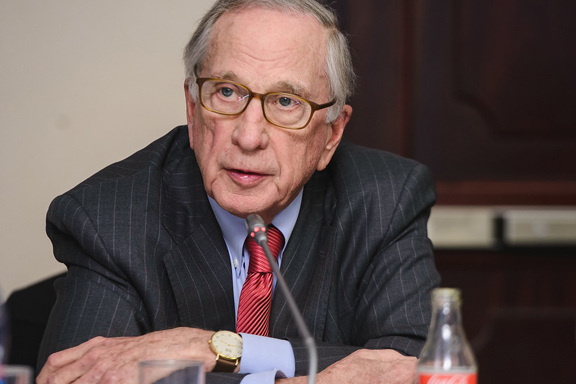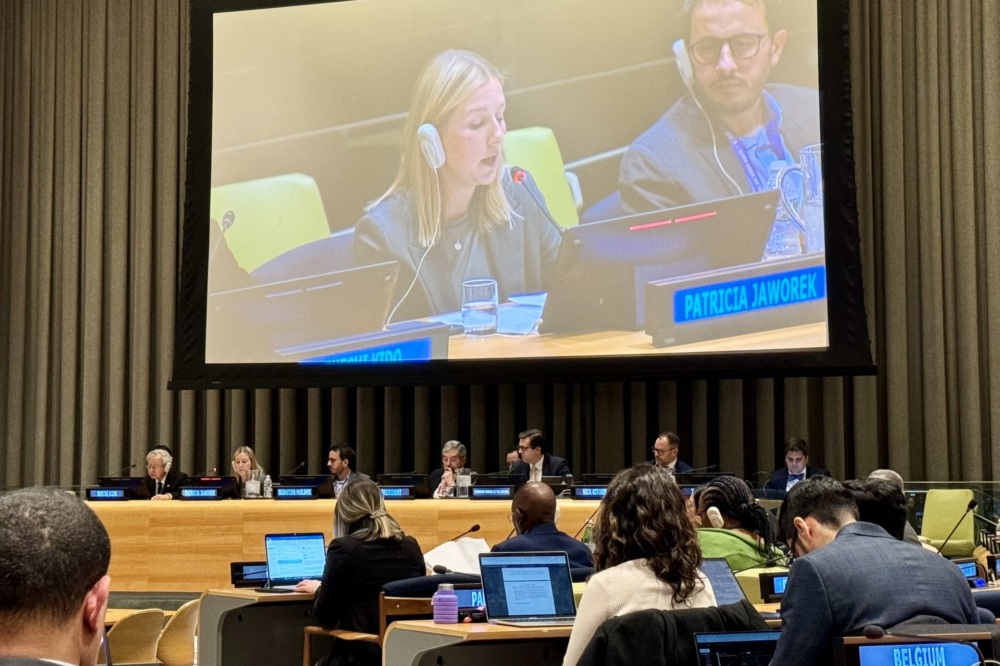
Sam Nunn
Co-Founder and Co-Chair, NTI
NTI co-chairman and CEO Sam Nunn spoke with Wolf Blitzer on CNN to discuss options for the U.S. in North Korea. Below is a transcript of the conversation, which appeared on CNN’s ‘Wolf’ show on April 24th, 2017.
BLITZER:
Here with us is Sam Nunn. He’s a former U.S. senator from Georgia, former
chairman of the Senate Armed Services Committee. He’s also the founder and co-chairman
and CEO of the Nuclear Threat Initiative. Senator, thanks so much for joining
us.
SAM
NUNN, CO-CHAIRMAN AND CEO, NUCLEAR THREAT INITIATIVE: Thanks, Wolf.
BLITZER:
Let me get your quick reaction to what Nikki Haley just said. If the North Koreans
were to test another nuclear bomb, if they were to test more ballistic
missiles, she says, I think, then, the president steps in and decides what’s
going to happen. What should happen if the North Koreans take those provocative
steps?
NUNN:
Well, I think all options ought to be on the table and military options. But I
also think the diplomatic option ought to be on the table. And that’s where we
do not seem to have a strategy, at this point in time. I certainly agree with
the emphasis that the president is putting on the U.N. and the potential of the
U.N., even though its often short of its goals.
One
thing that we have not really focused on, in the last two administrations, is
U.N. resolution 2270 which gives a mandate to all countries to search every
vessel and every plane coming in or out of North Korea to make sure there are
no illicit goods. That’s important from the pressure point of view. It’s also
important from preventing the leakage of nuclear materials which could be used
for catastrophic terrorism.
So,
this is an area that China voted for in the U.N. Security Council. It’s an area
where we can really work together. It’s an area where the United States can
strengthen our allies in southeast Asia, in terms of their capacity to search
these ships and so forth. So, it’s a very powerful tool that has been approved
by the United Nations Security Council.
BLITZER:
Because it seems the president’s strategy is to try to convince China, which
does have leverage, influence over North Korea, to be more assertive, more
aggressive and take steps to convince the North Korean regime to step back.
NUNN:
That’s exactly right and I think that’s what the president should be doing. And
I’m glad he’s talking to his counterpart in China.
BLITZER:
So, when you say he doesn’t have a strategy, he seems to — that seems to be a
strategy, right?
NUNN:
Well, I’m saying a diplomatic strategy. I certainly agree that talking to China
is a very big part of it. Our goal in Korea is to have a stable nonnuclear
Korean Peninsula. In my view, that can only be accomplished with the help of
China without a war.
BLITZER:
But do you think it’s really realistic that the North Korean regime of Kim
Jong-Un is going to give up its nuclear weapons?
NUNN:
Well, I’m not sure whether they will or not. Our goal, in the short term,
should be a freeze of both their missile tests as well as their weapons.
But
I think that one thing we ought to do on the diplomatic side is we should have
informal bilateral talks with North Korea. For — the number one reason is to
prevent some kind of miscalculation that could lead to absolutely catastrophe.
Mistakes can be made. So, I think that kind of informal dialogue would be in
and of itself –
BLITZER:
You want direct negotiation, direct talks between U.S. representatives and
North Korean representatives.
NUNN:
I wouldn’t call it negotiations. I’d call it dialogue, at this stage. It’s
important to make sure there’s no tragic miscalculation. Also, it’s important because that’s what
China has been urging us to do for the last couple of years and we haven’t been
willing to do it. It could make a difference in China’s willingness to really
step up and have a lot more pressure on North Korea, including the sanctions I
just mentioned.
BLITZER:
Because, clearly, the president right now, I believe accepts what former
President Obama told him in the final days of the Obama administration, that
North Korea, right now, represents the gravest national security threat facing
the United States. Do you believe that?
NUNN:
I think it’s a real threat. And as they develop the capacity to deliver nuclear
weapons, they already have nuclear weapons, deliver them to targets, I think
that’s enormously destabilizing, for South Korea and Japan already but
potentially for the United States.
BLITZER:
So, let’s say they have another nuclear test. They’ve had five in recent years.
They have a sixth right now. Let’s say they have another ballistic missile
test. What should the U.S. do?
NUNN:
Well, I think we ought to do what I just said. I think we ought to get China
involved. I think we ought to crack down on the sanctions. I think we should
have military options which are viable. We should strengthen the alliance
between the United States and South Korea and Japan, the military side of it,
and we should talk directly to the North Koreans informally because that kind
of informality is important. It’s not a formal negotiation. There should not be
preconditions. But we’ve got to make sure we don’t have a war that nobody
wants.
BLITZER:
Because if there’s any military confrontation, you know the North Koreans, they
have a million troops north of the DMZ with thousands of artillery pieces.
Seoul, the capital of South Korea, is, what, 30 miles below the demilitarized
zone. That area could be leveled within days.
NUNN:
Yes. We would win any war with North Korea and I hope they’re smart enough — I
think they are — to know that. But South Korea, our ally, could be decimated
while we are winning — while winning the war.
BLITZER:
Millions of people could get killed and there are almost 30,000 U.S. soldiers
along the demilitarized zone as well.
NUNN:
That’s right. A war is not in anybody’s interest. We have to have the military
option on the burner, but it shouldn’t be on the front burner. Diplomacy and
sanctions should be on the front burner.
BLITZER:
So when you say informal talks, you mean like a — some diplomatic back
channel, a third party going, representing U.S. interests and talking to the
North Koreans?
NUNN:
Well, it could be any of those, but I think at some point it would be ideal to
have officials from North Korea, including possible military officials, and
including those that have responsibility over the demilitarized zone, to talk
to their counterparts in the United States in terms of –
BLITZER:
Is it — is it smart for the U.S. to be deploying the USS Carl Vinson strike
force, that aircraft carrier battle group, to the Korean Peninsula now?
NUNN:
Well, I think that it is important to show military strength. I think it’s
important for Japan. I think it’s important for South Korea. But it’s also
important to have discussions so we don’t have a mistake, miscalculation, that
could lead to a war that neither North Korea, South Korea, Japan or the United
States wants. So all of those things need to be. This is not a sequential sort
of thing. We’ve got to do a number of things parallel. And the ones I
mentioned, I would, at least from my point of view, put on the front burner.
BLITZER:
Senator Sam Nunn, thanks very much for joining us.
NUNN: Thank you, Wolf. Appreciate it.
Sign up for our newsletter to get the latest on nuclear and biological threats.
NTI Program Officer Patricia Jaworek joined a panel discussion on the devastating humanitarian effects of nuclear weapons and shared her research on the subject.
The paper highlights the need for renewed attention to the catastrophic effects of nuclear conflict as a crucial step toward reducing the risk of nuclear use.
A new report from NTI highlights the critical need for a global diplomatic approach to address growing cyber risks, including, where possible, through cooperation between the United States and Russia.



